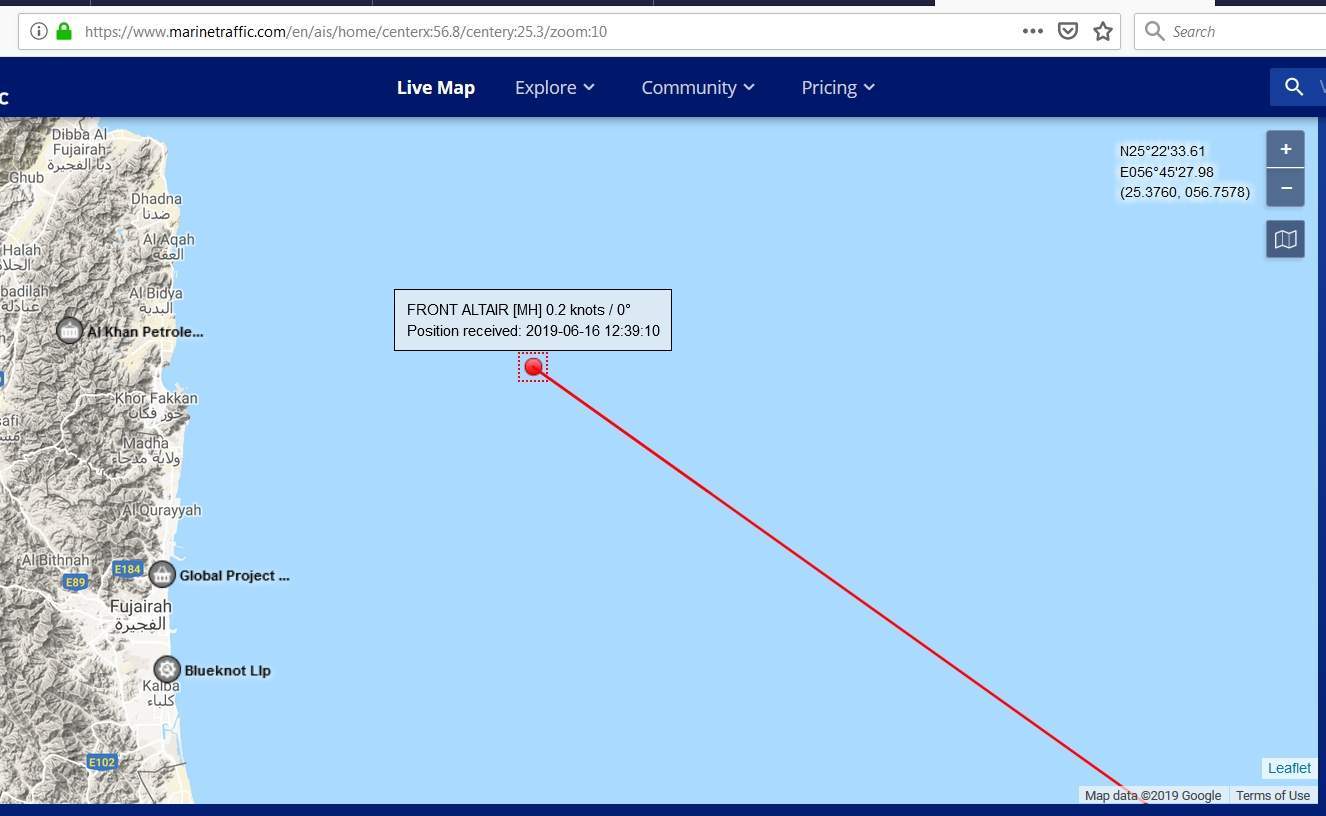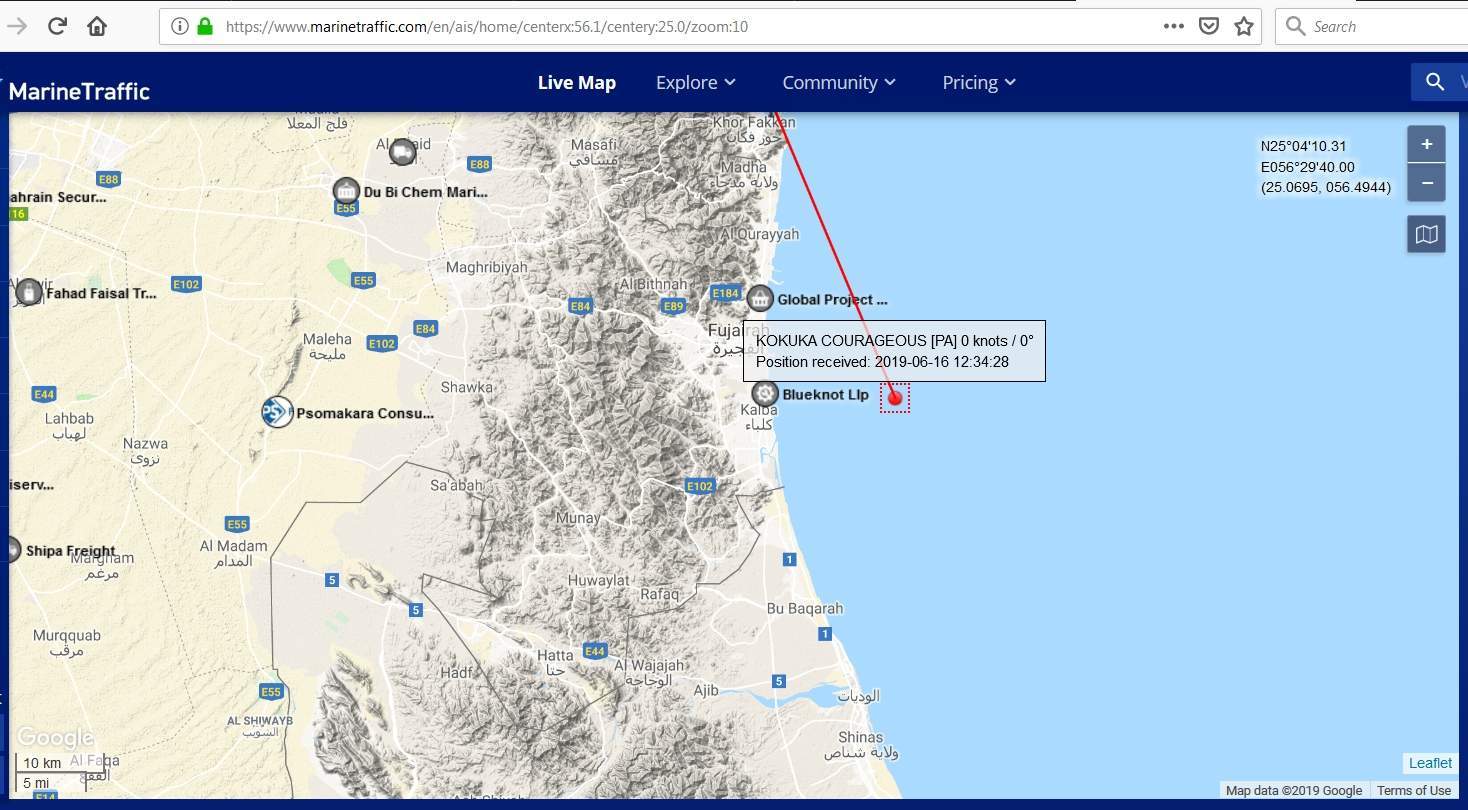TerraN_EmpirE
Tyrant King
Is Iran to blame for suspected attacks on Gulf tankers?
Analysts examine US claim that Iran was behind the reported attacks on commercial ships near the Strait of Hormuz.
by Maysam Behravesh
6 hours ago
Even in ordinary times, an attack on commercial tankers near the Strait of Hormuz - a vital sea lane for the world's oil supplies, located between Iran and Oman - would be a matter of concern for global trade.
That such incidents were reported on Thursday, at a time of soaring US-Iran tensions, makes them an even greater threat. Not just for global commerce, but also for peace and security in the region and the world.
Thursday's incidents, which caused damage to the Norwegian-owned Front Altair and Japanese-owned Kokuka Courageous, came just a month after the United Arab Emirates (UAE) reported "sabotage attacks" against four other commercial ships off the coast of its Fujairah emirate.
The US, which has been building up its military presence in the region, has blamed Iran for both events.
Advertisement
Hours after the latest incidents were reported, the US military released a grainy video that it said showed members of Iran's Revolutionary Guards Corps (IRGC) trying to remove an unexploded mine from the Kokuka Courageous.
Tehran has denied the US accusations, saying the latest claims are both "ridiculous" and "dangerous".
Mohammad Javad Zarif, Iran's foreign minister, also called the timing of the reported attacks "suspicious", given that a Japanese-owned ship was damaged while Japan's Prime Minister Shinzo Abe was on a visit to Tehran, seeking to defuse US-Iran frictions.
'Ridiculous, dangerous': Iran denies US claims over Gulf tankers (3:17)
As calls grew for an international inquiry, the owner of the Kokuka Courageous cast doubt on the US narrative, saying the vessel's crew saw a "flying object" before it was rocked by a second blast.
"I do not think there was a time bomb or an object attached to the side of the ship," Yutaka Katada said on Friday.
Analysts reacted to the US allegations with scepticism. Even those who found the claims credible said Washington may have forced Iran's hand with its "maximum pressure" campaign of punishing financial sanctions.
Threat to close Strait of Hormuz
"Tehran has the capability to commit such attacks and has threatened to interfere with shipping in the Gulf while it is also in a state of desperation due to the tight sanctions and international isolation," said Max Abrahms, professor of political science at Northeastern University in the US.
That Iranian threat followed a US bid to bring Iran's oil revenues down to zero. The US move, announced in May, came after Washington re-imposed sanctions on Iran, a year after exiting an international accord that lifted global sanctions in exchange for curbs on Tehran's nuclear programme.
US President Donald Trump said the renewed financial pressure was aimed at forcing Iran to negotiate a new deal that would also address its ballistic missiles project.
Iran, however, has remained defiant.
Despite US sanctions triggering an economic crisis in the country, Iranian leaders said they would not be bullied into talks with the US. Instead, they threatened counter-measures, including the closure of the Strait of Hormuz, through which more than a third of all oil traded by sea passes.
"According to international law, the Strait of Hormuz is a marine passageway and if we are barred from using it, we will shut it down," General Alireza Tangsiri, commander-in-chief of the IRGC's navy, said in April.
Iran's President Hassan Rouhani said the same last December. "If one day they want to prevent the export of Iran's oil, then no oil will be exported from the Persian Gulf," he had warned.
The Islamic Republic has also warned it will withdraw from the nuclear accord if other parties to the agreement - Germany, France, the United Kingdom, Russia and China - fail to shield Tehran from the US penalties.
Barbara Slavin, director of the Future of Iran Initiative at the Atlantic Council, said if Iran was responsible for Thursday's attacks, it was carrying out its repeated threats that other countries in the region would also "face obstacles" in exporting oil.
"The aim would be to show the international community that its acquiescence to US secondary sanctions is not cost-free and to show the Trump administration that far from curbing Iran's 'malign' policies, US actions are incentivising them."
'Scepticism warranted'
But with Iran still appealing to the remaining signatories to deliver on its promised economic benefits, Abrahms said it was not in Tehran's interests to disrupt trade in the Gulf.
"The question arises as to why Tehran would commit such an attack because it only harms Iran on the world stage and helps its enemies, while scepticism is also warranted due to the unreliability of [US] intelligence," he said, referring to the faulty intelligence Washington used to justify its invasion of Iraq in 2003.
Despite Iran's defiance to the US's moves, attacks on international oil shipments in the Gulf represented a qualitatively different type of activity, others noted.
"It could not be Iran's job or even that of certain elements within the Iranian state," said Hamidreza Azizi, professor of international relations at Shahid Beheshti University in Tehran.
"Consider the coincidence of these attacks with Abe's landmark trip to Tehran, the presence of Russian crew on Norwegian-owned Front Altair, the proximity of the incident site to Iran's territorial waters, and finally the Supreme Leader Ayatollah Ali Khamenei's emphasis that "resistance" does not mean military action, and you will realise Tehran is not the culprit," he said.
"It sounds like a provocative false-flag operation staged by Iran's regional nemeses so they could play the victim and portray Tehran as the chief devil in the room even as they are trying to torpedo any chance of negotiations between Tehran and Washington and dragging Iran into a conflict they crave for but cannot win alone," Azizi added.
'All-out war'
Regardless of who was behind Thursday's incidents, insecurity in the Gulf is likely to persist "until the US and its allies change their aggressive behaviour towards Iran and let off steam", said an IRGC-affiliated intelligence analyst.
Speaking to Al Jazeera on the condition of anonymity, the analyst said some in Tehran believe a large-scale confrontation in the Gulf is unlikely because such a conflict would also have severe consequences for the US and its regional allies.
"If these escalations lead to military confrontation between Iran and the US by any chance, Tehran's response will not be limited to the US, but will definitely involve its allies in the neighbourhood; they will see the end of their rule," the analyst explained.
"They might be hoping for a limited conflict, but that's not how things will turn out in the case of Iran. It will be an all-out war but let's not forget that it was the US that started this spiral
USN YouTube channel release of Video showing what is reported as IRGC removing Limpet mine


